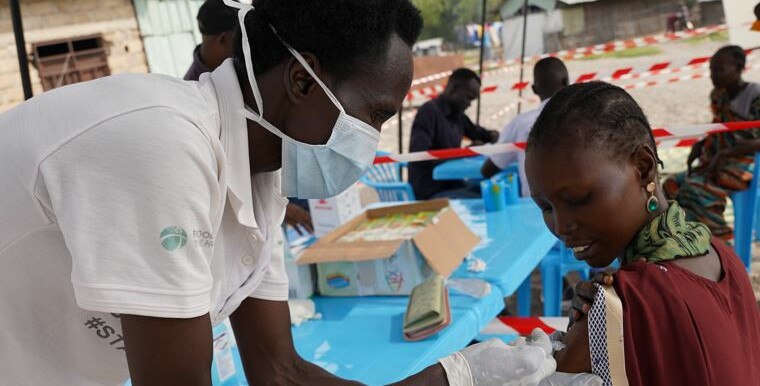Amid a deadly hepatitis E outbreak, Médecins Sans Frontières/Doctors without Borders (MSF) has launched a mass vaccination campaign to reach remote communities and prevent more deaths in Jonglei State’s Fangak County.
According to a press statement on Monday, in response to a deadly hepatitis E outbreak in South Sudan, MSF has launched a vaccination campaign in collaboration with the Ministry of Health to protect women and girls of reproductive age, who are at greatest risk of death from the disease.
Fatality can be as high as 40 percent among pregnant women, and there is no cure, meaning that many of those at advanced stages of illness do not survive, the medical charity said.
Since April 2023, 501 cases of hepatitis E have been treated at the MSF hospital in Old Fangak, Jonglei State, and 21 people – mainly women – have died. The vaccination campaign – the first to be conducted during the acute stages of an active outbreak and in such a remote and isolated part of South Sudan – is intended to prevent further loss of life.
Mamman Mustapha, MSF’s Head of Mission in South Sudan explained that Hepatitis E is a waterborne disease that can be fatal and that around 20 million people become infected every year, and of these, three million people experience symptoms that require treatment.
“However, not everyone is able to access treatment in good time – especially in countries with limited numbers of health facilities like South Sudan,” he said. “In such locations, even if people do eventually manage to get to a hospital, it is often too late. There is no cure for hepatitis E and sadly, 70,000 people die from the disease each year. This is why the vaccine is so important– it can save lives.”
The vaccine was developed in 2012 and has been approved for use in emergency settings by the World Health Organization (WHO) since 2015. However, despite this, it has only ever been used once before. This was in 2022 when MSF carried out a world-first by using the vaccine in a mass vaccination campaign in the Bentiu internally displaced persons camp – also in South Sudan. At that time, the outbreak had been ongoing for more than two years. The vaccine was used to provide future protection to over 25,000 people. This latest campaign in Fangak County builds on the experience in Bentiu but is being administered in a vastly different context, according to MSF.
“Fangak County is situated in an extremely remote part of northern South Sudan on the Sudd marshes –a vast area of wetland dotted with small communities, where people have exceptionally limited access to even the most basic of health care,” Mustapha added. “Even getting our routine childhood vaccinations to Old Fangak is a challenge. It is only possible to reach the hospital by boat, using the river Nile, or by air. But the airstrip at Old Fangak has been flooded for the past four years, so we first had to fly the vaccines to a nearby village, and then transport them for a further 35 km along the river to our hospital. The vaccines need to be kept between 2 and 8 degrees Celsius, and although this is relatively easy at our hospital, it is a completely different ball game trying to ensure that we do not break the cold chain during the eight hours it takes to reach some of the communities we are targeting with this campaign.”
Life was already hard in Fangak County even before hepatitis E began to claim people’s lives. Over the past four years, recurrent flooding has destroyed people’s crops and drowned their cattle.
The medical charity says that an additional challenge is the limited availability of the vaccine – and its high cost.
“Production is licensed to only one manufacturer in China and it is not produced in large quantities. It is also bulky, compared to other vaccines, and therefore difficult to transport and store – especially in hard-to-reach areas like Old Fangak,” the statement said. “These challenges represent significant barriers when it comes to responding to disease outbreaks in emergency settings like South Sudan. MSF is calling for these barriers to be lifted so that far greater numbers of people can be protected – particularly women and girls of childbearing age who remain the population group that is most at risk.”
The vaccine requires three doses at 0, 1, and 6 months. By June 2024, when the vaccination campaign is complete, MSF intends to have fully vaccinated 12,776 women and girls aged 16-45.
“In addition to the vaccination campaign itself, MSF is carrying out case management and referrals at its hospital, conducting community awareness campaigns and epidemiological surveillance,” the statement added.
However, MSF urged international and local health and humanitarian organizations to take action to improve the water and sanitation conditions in Old Fangak through awareness raising, implementing proper sewage and sanitation facilities such as toilets and waste disposal systems, and drilling boreholes to ensure the availability of safe drinking water.
“This is vital for stopping the spread of the disease and preventing outbreaks in the future,” MSF said.




